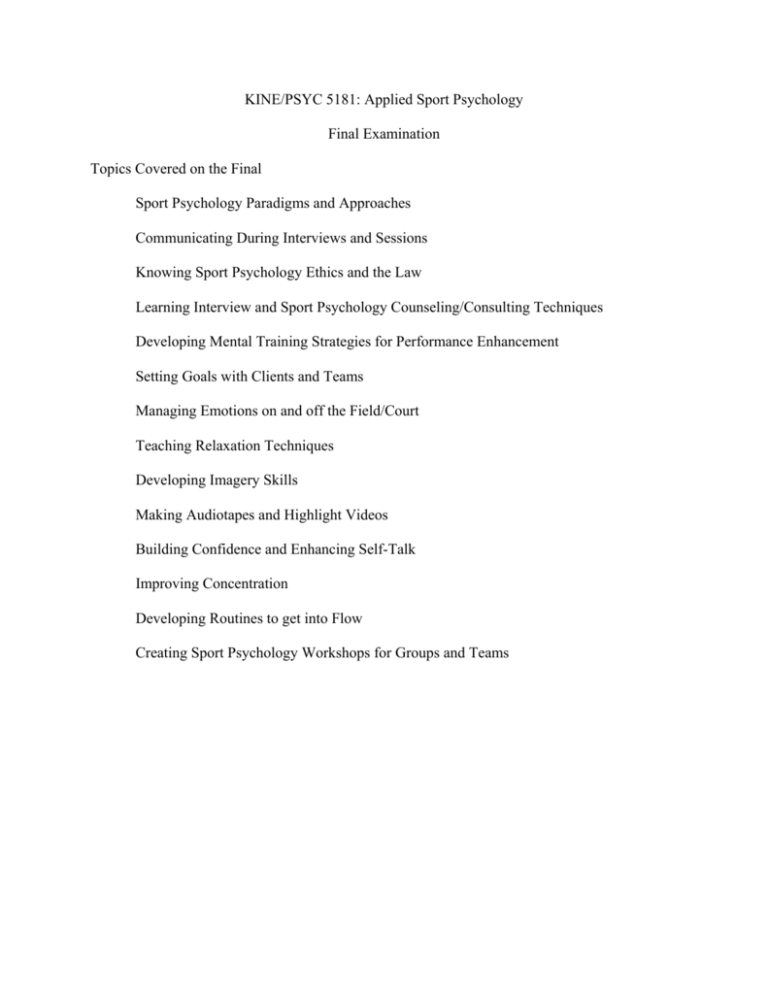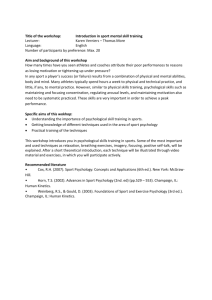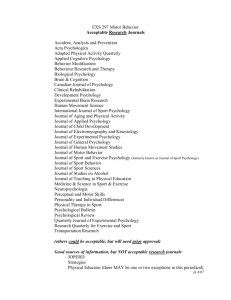KINE/PSYC 5181: Applied Sport Psychology Final Examination
advertisement

KINE/PSYC 5181: Applied Sport Psychology Final Examination Topics Covered on the Final Sport Psychology Paradigms and Approaches Communicating During Interviews and Sessions Knowing Sport Psychology Ethics and the Law Learning Interview and Sport Psychology Counseling/Consulting Techniques Developing Mental Training Strategies for Performance Enhancement Setting Goals with Clients and Teams Managing Emotions on and off the Field/Court Teaching Relaxation Techniques Developing Imagery Skills Making Audiotapes and Highlight Videos Building Confidence and Enhancing Self-Talk Improving Concentration Developing Routines to get into Flow Creating Sport Psychology Workshops for Groups and Teams Sample Examination Questions Possible Matching Questions 1. Silence on the part of the sport psychology practitioner a. can be considered a response. b. should be used extensively. c. doesn’t communicate anything to the client. d. interferes with the client’s communication. 2. When an interview becomes “bogged down,” the sport psychology practitioner should a. wait in patient silence. b. ask if client is tired. c. move about the room. d. ask client to summarize. 3. If a client is asked a “why” question, he will usually a. evaluate his behavior. b. condemn his behavior. c. rationalize his behavior. d. All of the above 4. One way of removing obstacles to effective communication is to a. respond vaguely so that the interviewee will not consider you to be judgmental. b. practice restating what the interviewee has said and felt before responding. c. interrupt if you are afraid that you do not understand the interviewee’s intended meaning. d. talk an equal amount, but never more, than the interviewee. 5. According to Murphy (1995), confidentiality is a consistent problem faced by sport psychology practitioners. He suggests that a. the sport psychology practitioner’s first loyalty should be to the person paying for the services. b. the sport psychology practitioner should be ready to give a profile of an athlete to the coach when asked. c. the sport psychology practitioner should inform the coach and/or athlete at the beginning of the working relationship about how crucial confidentiality is and how the practitioner’s code of ethics can avoid many future problems. d. the sport psychology practitioner refer the client to another person when ill-equipped to deal with the issue Possible Essay Question Discuss various ways that attention and attentional focus can be assessed. Provide a brief discussion of Nideffer’s test of Attentional and Interpersonal Style (TAIS) relative to the measurement of attentional focus. Upon completing the TAIS, what did your profile indicate? Explain your results. If you were a NASCAR driver how might you perform based on your profile? How might you improve your racing performance?





